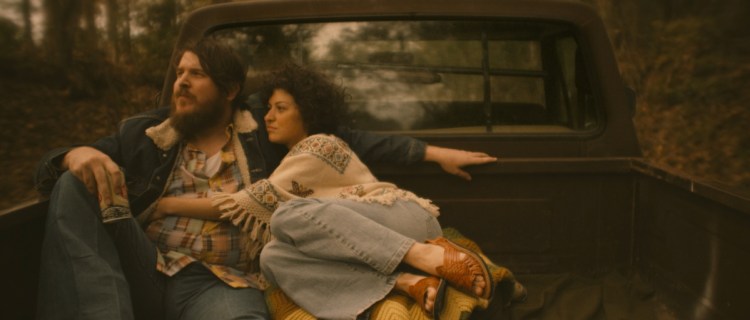Director Ethan Hawke begins his bio-drama of the end life of Arkansas-born country western Blaze Foley with a three-way postmortem on the life and death of Foley.
We see and hear Hawke speaking to Townes Van Zandt (Bob Dylan sideman Charlie Sexton) and another musician who knew Foley, opening the story like an old box full of snippets and songs, to reveal the life of Foley, a relatively obscure Texas bar singer and songwriter.
Never a fan of “Outlaw” music, its artists, or anything that grew out of that very American art form, I had to dig deeply to fill in the empty spaces about this so called outlaw country singer, who, some say, lived in the wild whiskey fog-world of true legends Merle Haggard and the irrepressible Willie Nelson, and was shot dead in a somewhat mysterious encounter, at age 39 in 1969.
Foley (Ben Dickey, in his debut film appearance) stumbled through his life fueled, as many road musicians are, by drugs and alcohol. Foley, who produced a few obscure albums that never reached as wide an audience as Haggard and Nelson, spent most of his musical career filling open spots in all those seedy, one toilet bars that are strewn across the backroads and riversides of the lower half of America. He was best known for two pieces: “If I Could Only Fly” and “Clay Pigeons.”
Of course Nelson and Haggard, Johnny Cash and hundreds of musicians, flowed in and out of those spots as well, and all had their share of downtime.
Lady Luck certainly favored them more than Foley, and all had more patience, discipline and eventually, a greater fan base.
Foley, it seems, owed what popularity he managed to gather about him, from a natural kind of down river, back porch presence. In Hawkes’ film we watch as Foley tumbles in and out of his night spots, propping himself up on a stool, and pulling his guitar to his full belly.
He strums a bit, tells tall stories and personal stories, and gets, now and then, a smattering of laughs. And that’s all such strolling pilgrim players need, that, a couple of free drinks and Jesus, to get them through the long dark, empty nights that haunt them.
I’ve spent a minute or two in one or more of those saloons from Natchitoches, Louisiana, to Waco, Texas, and Hawkes gets it right, from the blinking neon Bud Light beer, urine smelling floors and florescent ghost lights in the kitchen.
He gets his people right as well, the way they lean on the bar, tilt their eyes to the stage, and tap their toes along with the music. They all played their roles well.
But Dickey, trying as hard as he does, doesn’t seem to emit the lost strains of magic that the real Foley was apparently known for. In this heartfelt effort, he comes across as an amateur player, and fails to win me over.
Thank God for Alia Shawkat, as Sybil, a girl he met at a small acting class. Sybil was his live-in girlfriend, who shared discomfort in a buggy woodsy shack deep in the pines.
It is Shawkat who brings what small light and professionalism there is to “Blaze.” Shawkat is best known for “State of Grace” and “Arrested Development.” “Blaze,” a nice try by Ethan Hawke, throws no light, little heat and barely a spark.
J.P. Devine, of Waterville, is a former stage and film actor.
Send questions/comments to the editors.



